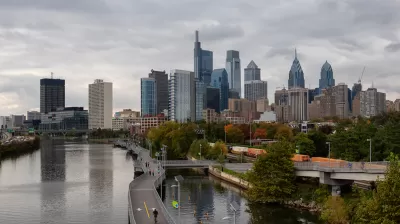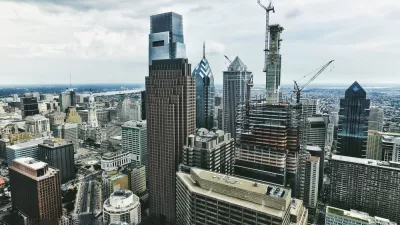City leaders hope a new affordable housing law will increase the supply of affordable units in the city, but critics say the policy may lead to reduced construction and higher housing costs.

As Matthew Rothstein reports for Bisnow, "On Jan. 18, Mayor Jim Kenney signed into law Philadelphia City Council Bill No. 210633, which requires any new residential buildings of 20 units or more to set aside 20% of those units for affordable housing." The new mandatory inclusionary zoning law only applies to portions of two council districts, prompting questions about unintended consequences like displacement and gentrification.
According to Rothstein's article, "The Olde Kensington overlay created by the law overlaps with HACE’s service area, where a heavily Latino population is feeling the pressure of an ongoing wave of development bringing higher-income households to the area." Rothstein cites critics of the law who say that "Philadelphia housing doesn’t achieve the market-rate rents and home prices necessary to keep development going in the affected areas."
In an article in the Fairfield Sun Times, M. Nolan Gray argues that "Between high construction and land costs – in addition to the new mandate that developers give up a fifth of all the units they produce – it’s likely that few developments, if any, will prove viable." Gray points to examples from other cities: "Since adopting a similarly aggressive ordinance in 2016, Portland has seen new multifamily permit applications plummet." According to Gray, "Indeed, to the extent that mandatory inclusionary-zoning programs act as a major new tax on housing development, they have been found to drive up housing costs."
Gray provides a series of recommendations that include "allowing more housing construction in high-opportunity neighborhoods with ample access to jobs and transit" while also finding more effective uses for existing assets like city-owned vacant lots. "To avoid the fate of other high-cost cities along the northeast corridor, Philadelphia must keep its current housing boom alive, while being smart about preventing displacement and adding new affordable housing."
FULL STORY: Philly's First Mandatory Inclusionary Zoning Law Is Official, And It Takes Effect In 6 Months

Trump Administration Could Effectively End Housing Voucher Program
Federal officials are eyeing major cuts to the Section 8 program that helps millions of low-income households pay rent.

Planetizen Federal Action Tracker
A weekly monitor of how Trump’s orders and actions are impacting planners and planning in America.

Ken Jennings Launches Transit Web Series
The Jeopardy champ wants you to ride public transit.

Crime Continues to Drop on Philly, San Francisco Transit Systems
SEPTA and BART both saw significant declines in violent crime in the first quarter of 2025.

How South LA Green Spaces Power Community Health and Hope
Green spaces like South L.A. Wetlands Park are helping South Los Angeles residents promote healthy lifestyles, build community, and advocate for improvements that reflect local needs in historically underserved neighborhoods.

Sacramento Plans ‘Quick-Build’ Road Safety Projects
The city wants to accelerate small-scale safety improvements that use low-cost equipment to make an impact at dangerous intersections.
Urban Design for Planners 1: Software Tools
This six-course series explores essential urban design concepts using open source software and equips planners with the tools they need to participate fully in the urban design process.
Planning for Universal Design
Learn the tools for implementing Universal Design in planning regulations.
Heyer Gruel & Associates PA
Ada County Highway District
Institute for Housing and Urban Development Studies (IHS)
City of Grandview
Harvard GSD Executive Education
Toledo-Lucas County Plan Commissions
Salt Lake City
NYU Wagner Graduate School of Public Service





























